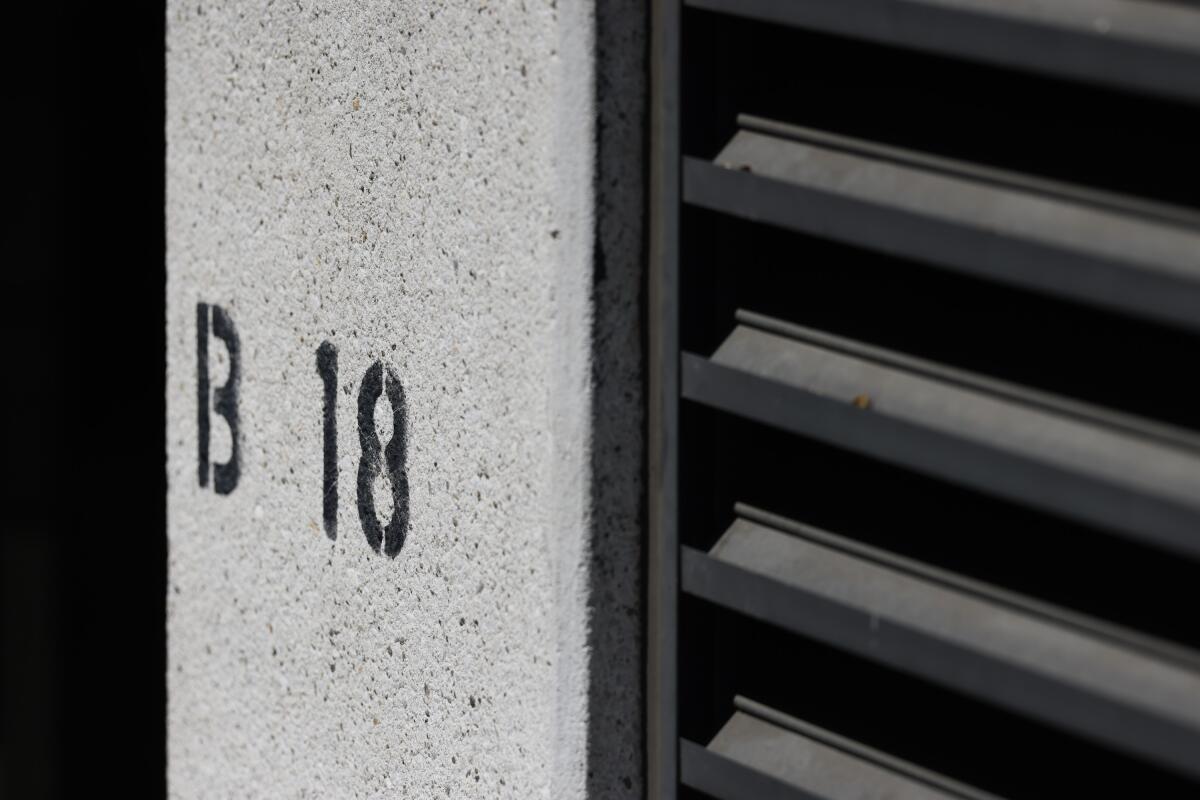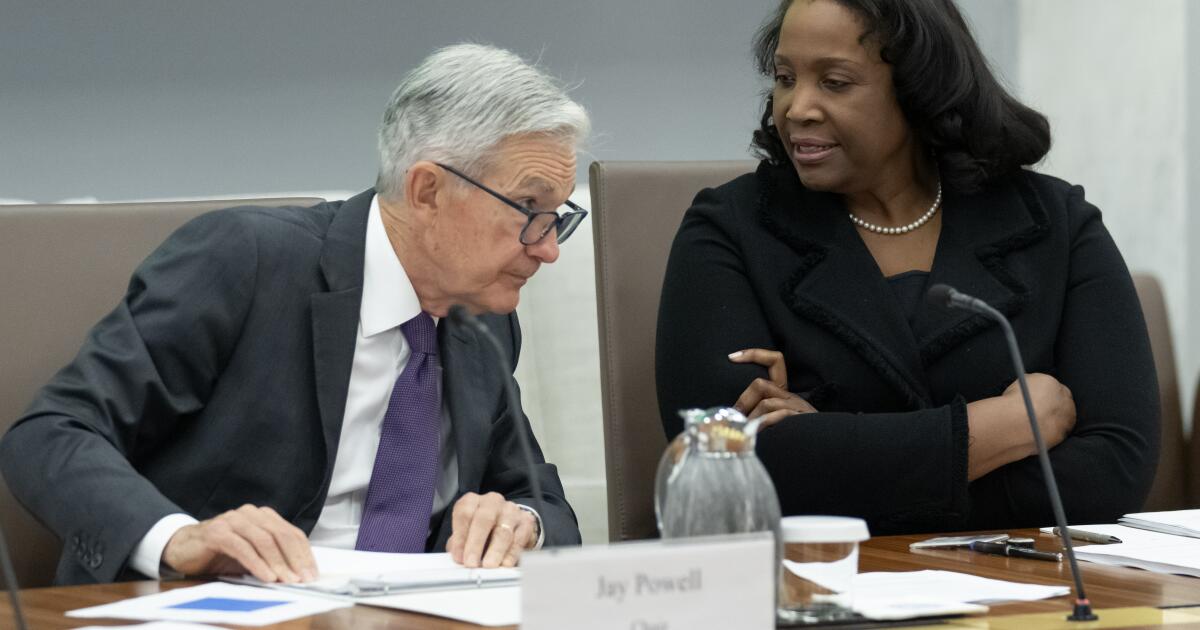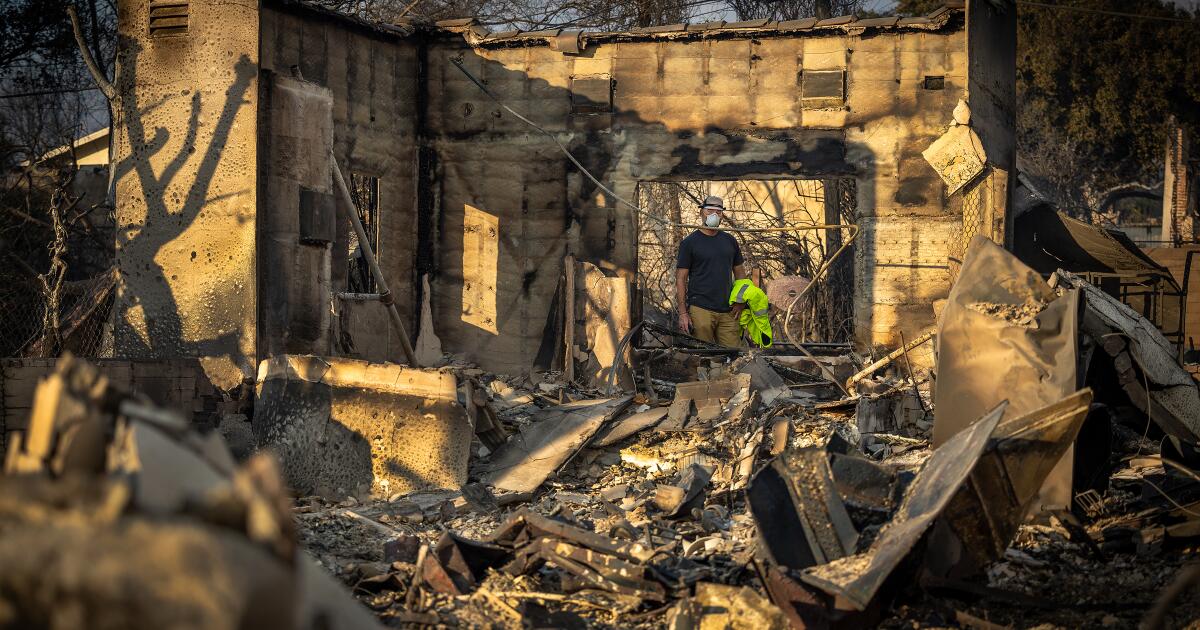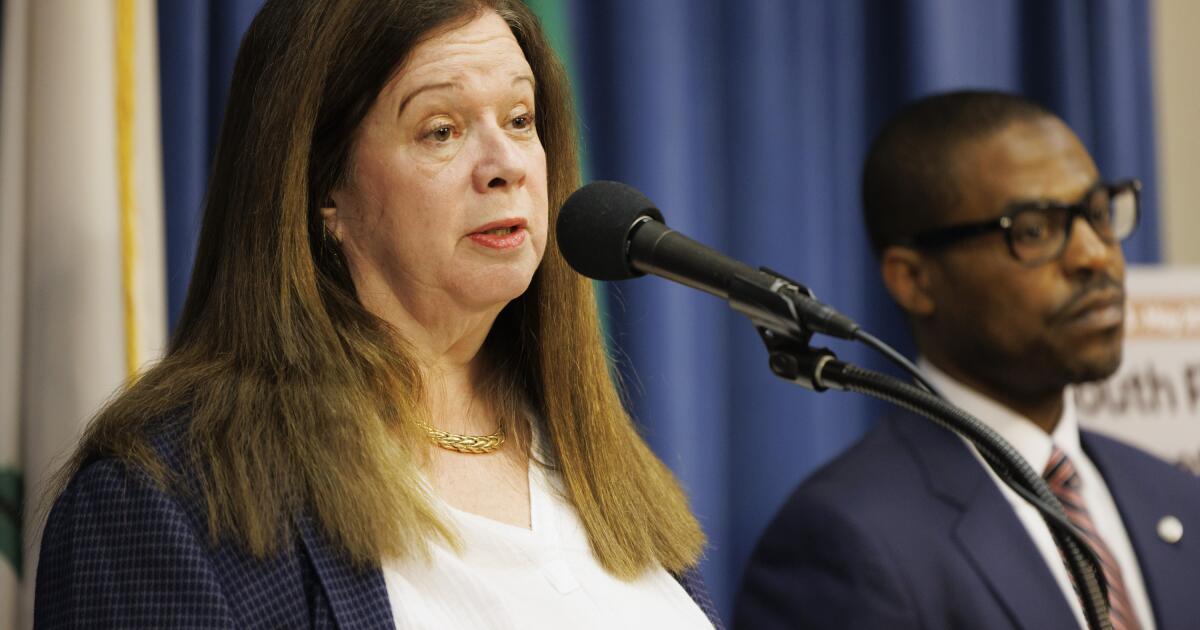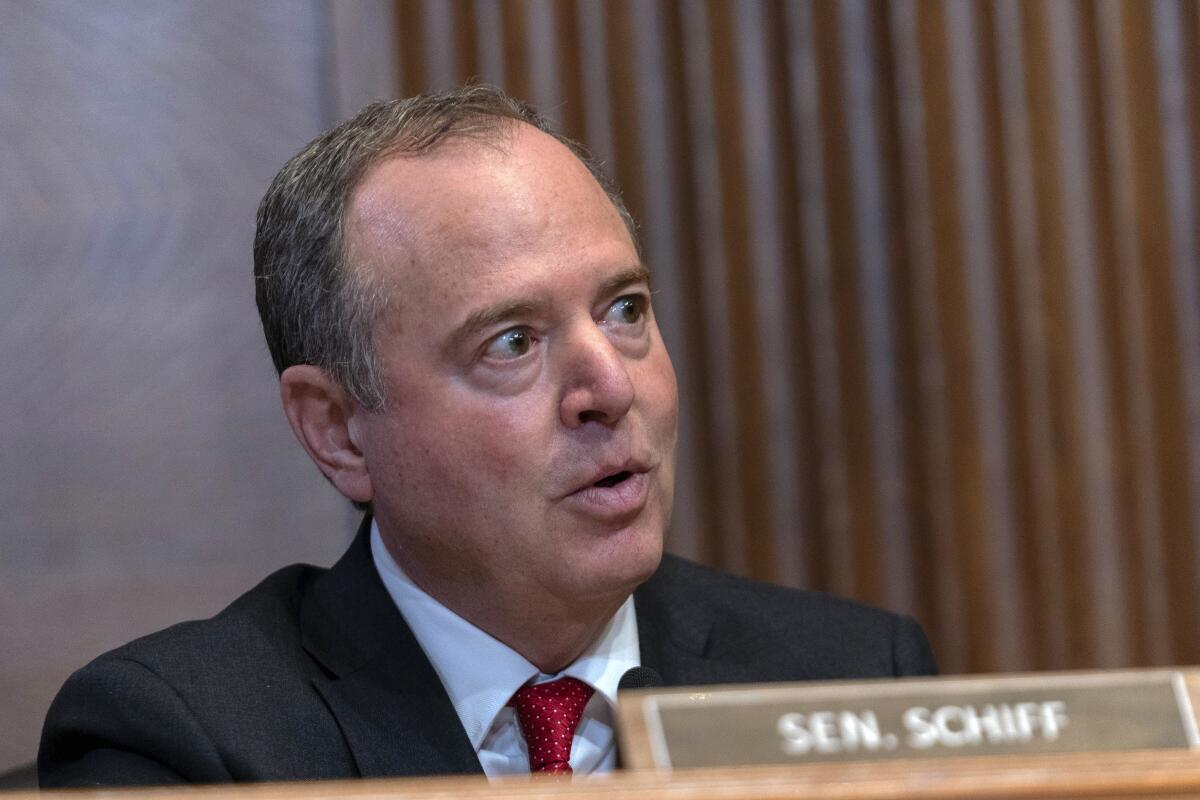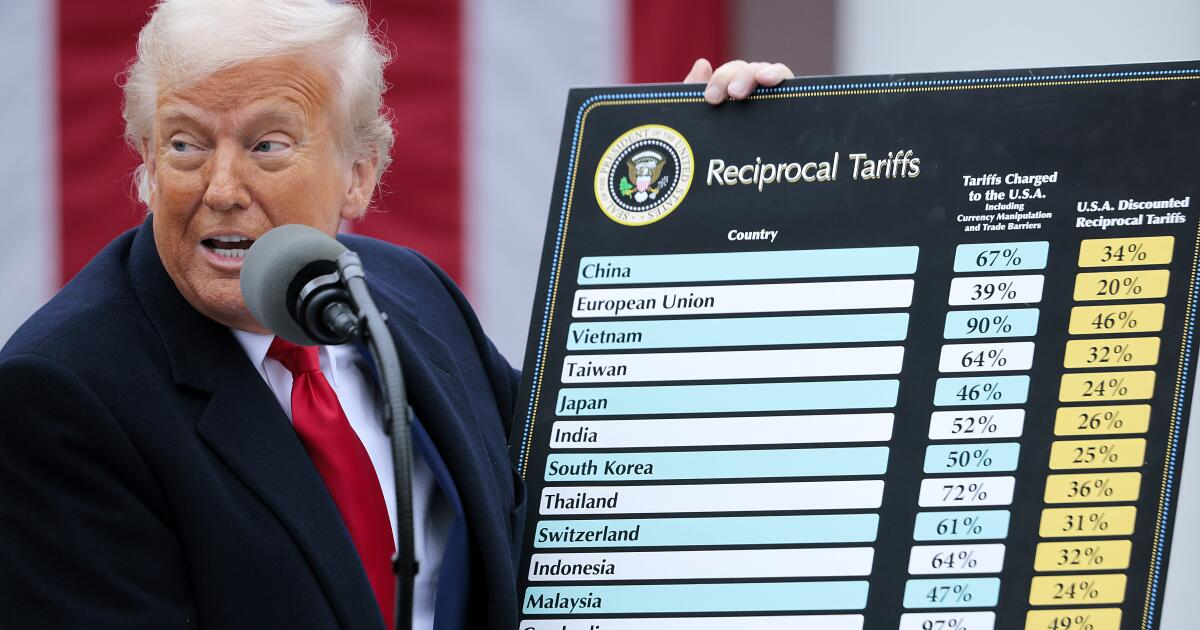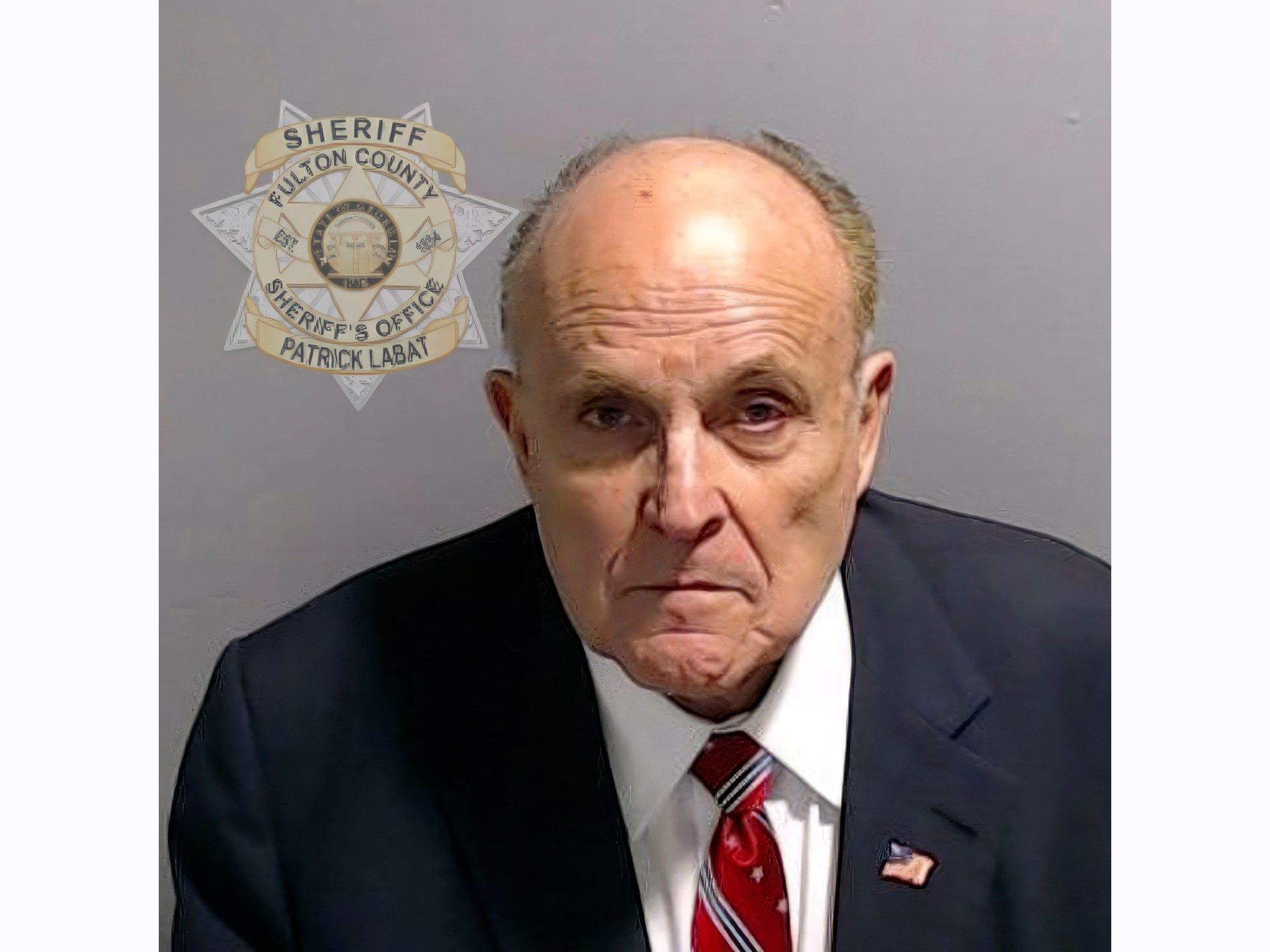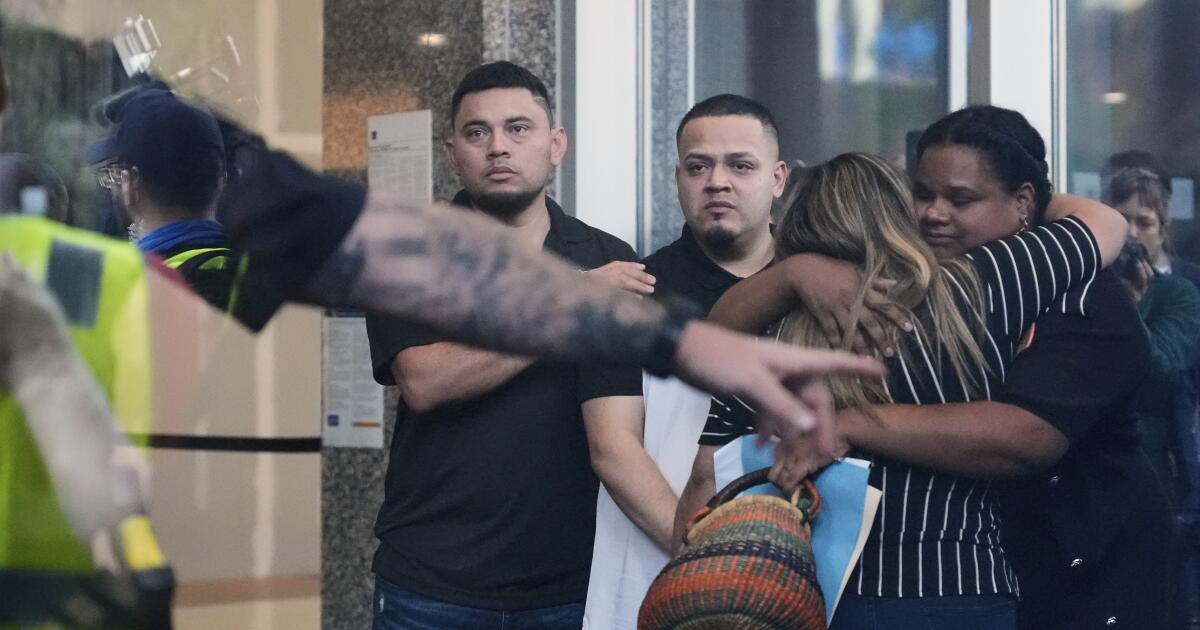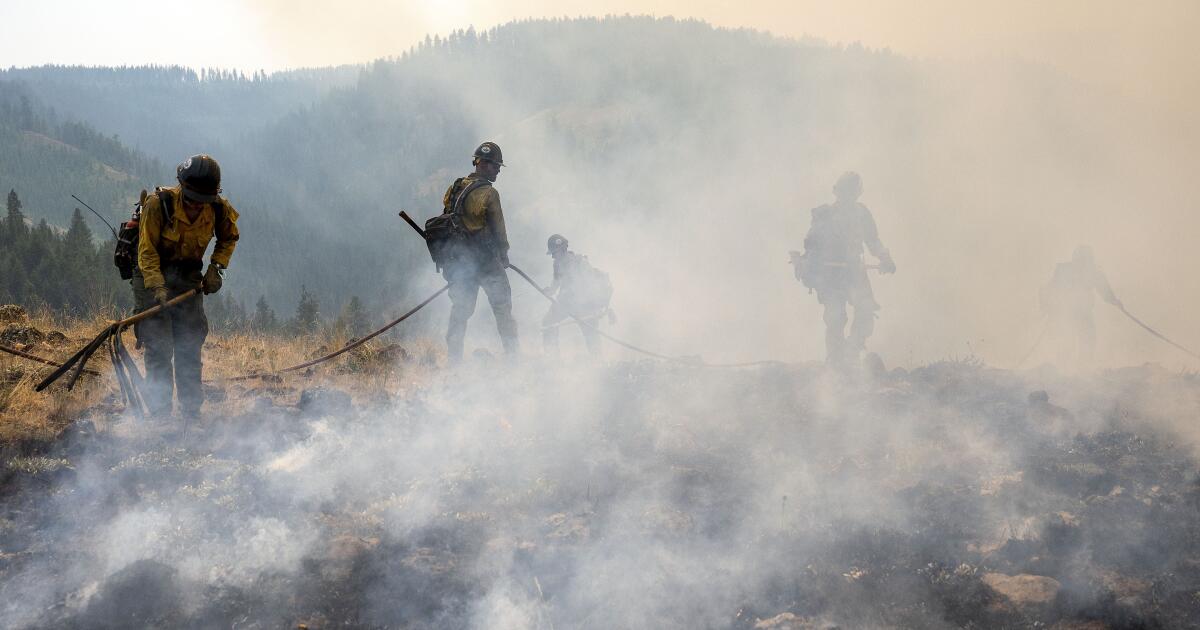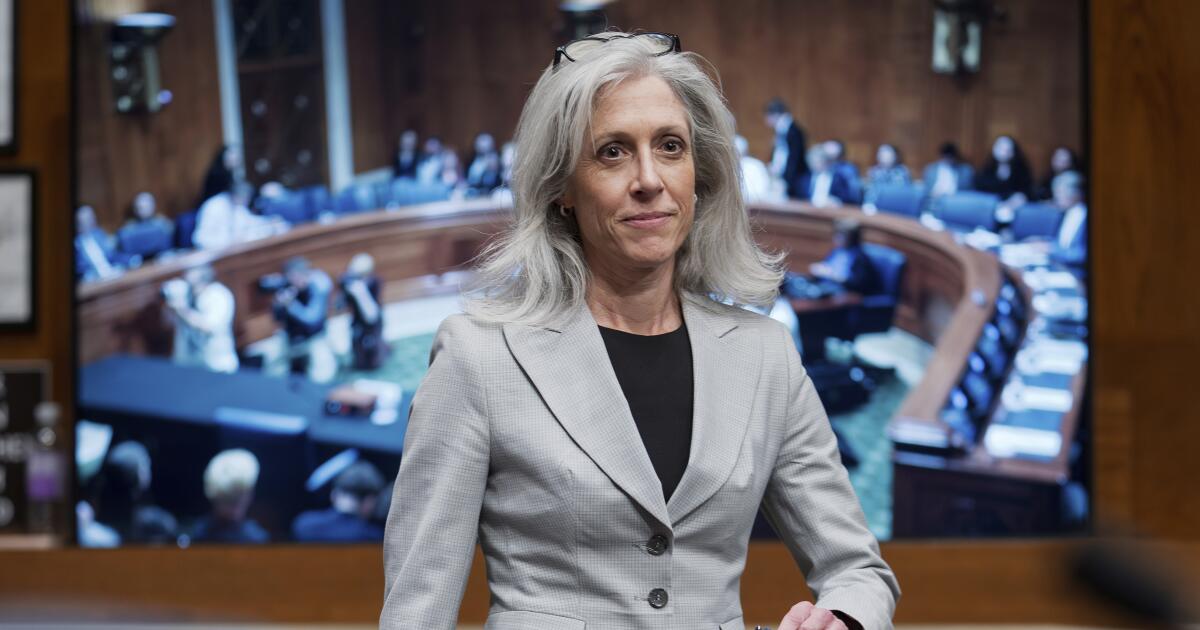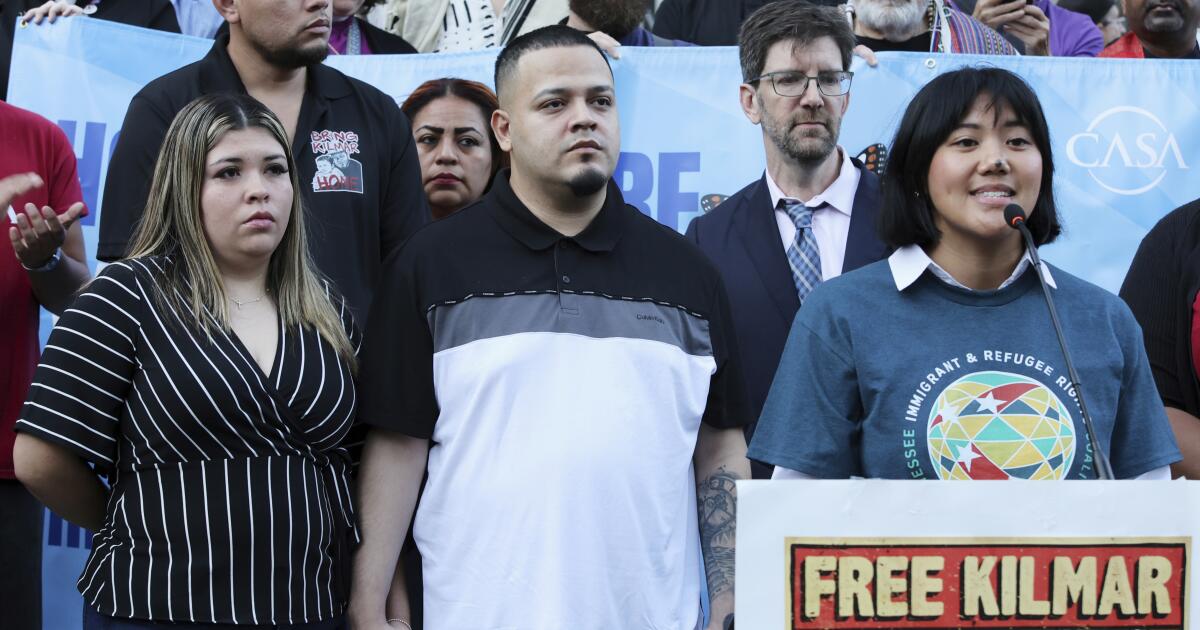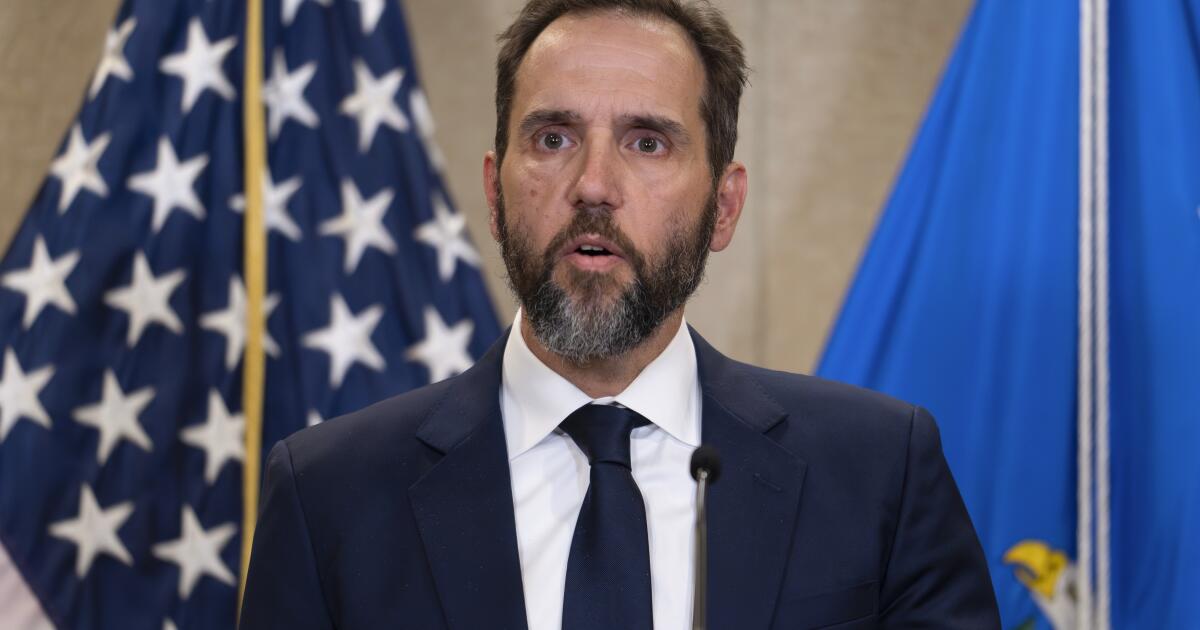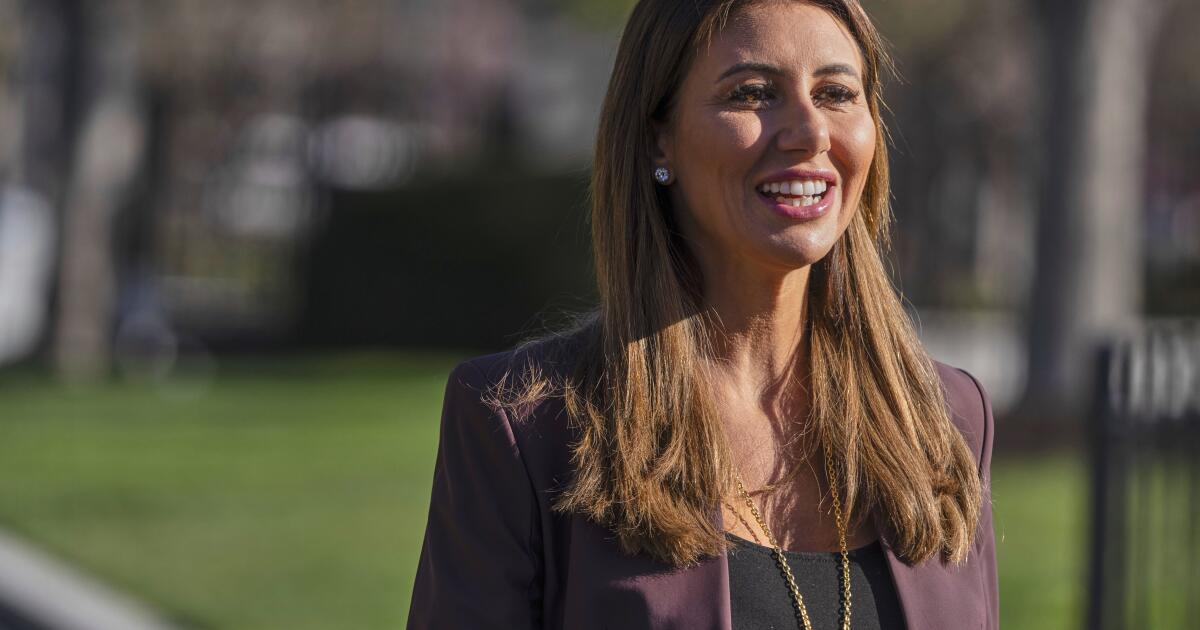A strawberry delivery driver arrested by Border Patrol tries to make his way home
The lights never dimmed and Angel Minguela Palacios couldn’t sleep. He pulled what felt like a large sheet of aluminum foil over his head, but couldn’t adjust to lying on a concrete floor and using his tennis shoes as a pillow.
He could smell unwashed bodies in the cramped room he shared with 40 detainees. He listened as men, many of them arrested at car washes or outside Home Depots, cried in the night for their loved ones.
Minguela, 48, lay in the chilly downtown Los Angeles ICE facility known as B 18 and thought about his partner of eight years and their three children. In his 10 years in the United States, he had built a secure life he had only dreamed of in Mexico, ensconced in their humble one-bedroom rented home, framed photos of the family at Christmas, his “#1 Dad” figurine. Now it was all falling apart.
The morning of Aug. 14, Minguela had been on his last delivery of the day, dropping off strawberries to a tearoom in Little Tokyo. He didn’t know that Gov. Gavin Newsom was holding a news conference there to inveigh against President Trump’s efforts to maintain control of the U.S. House of Representatives through redistricting in Texas. U.S. Border Patrol agents were massing nearby, creating a show of force outside the event.
As they moved in, one agent narrowed in on Minguela’s delivery van. Soon, he was in handcuffs, arrested for overstaying a tourist visa. As his lawyer put it, Minguela became “political, collateral damage.”
Over the six days he spent in B 18, a temporary immigration processing center, Minguela watched as several detainees chose to self-deport rather than remain in detention.
A building marking is painted on a wall at an Immigration and Customs Enforcement facility known as “B 18.”
(Carlin Stiehl / Los Angeles Times)
”No aguanto aqui,” the men would say. “I can’t take it here.”
The harsh conditions, Minguela said, felt intentional. He knew he needed to stay for his family. But he wondered if he’d make it.
::
Minguela fled Mexico in 2015, driven in part by violence he faced there.
In his time servicing ATMs in Ciudad Juárez, he said he was kidnapped twice and at one point stabbed by people intent on stealing the cash. After his employers cut staff, he lost his job, helping drive his decision to leave.
Minguela came to Texas on a tourist visa and left the same day to L.A. drawn by the job opportunities and its many Spanish speakers. He had little money, rented a room as he searched for employment and soon found a job at the downtown produce market.
He met the woman he calls his esposa, who asked not to be named for fear of retaliation, at the second job he worked in the Piñata District. They are not married but Minguela helped raise her two children and later their son, who is autistic. The children — 15, 12 and 6 — all call him Dad.
With Minguela there, his esposa said she never felt alone. He helped with the laundry and cleaning. He played Roblox with his middle son and helped his 15-year-old daughter with her homework, especially math.
“He would always make sure that we would stay on track,” his daughter said. “He would always want the best for us.”
Photos captured the life they had built in L.A. The family in San Pedro for a boat ride. Celebrating Father’s Day and birthdays with cake and balloons. At a Day of the Dead celebration on Olvera Street downtown.
Angel Minguela Palacios with his partner of eight years and their 6-year-old son.
(Carlin Stiehl/Los Angeles Times)
When immigration raids began in June, their lives suddenly narrowed. Minguela rarely went out, leaving the house only for work and errands. His daughter would warn him if she heard rumors of immigration officers near her high school, so he wouldn’t risk picking her up.
Minguela planned ahead, made copies of his keys and left money for his family in case he was grabbed by immigration agents. But he never expected it would happen to him.
On Aug. 14, his alarm went off at 1:15 a.m., as it did almost every day. He drank the coffee his wife had brought him as he headed to the produce market, where he’d worked for the same company for eight years.
Minguela helped take orders of strawberries, raspberries and blueberries, before heading out to make deliveries around 8 a.m. He had around half a dozen places to hit before he would call it a day.
His partner called to warn him that she’d seen on social media that ICE officers were near one of his delivery spots. He had just been there and luckily missed them, he said.
He was relieved that the Little Tokyo tearoom was his last stop. It didn’t open until 11 a.m. He arrived 10 minutes after. He found a parking spot out front and began unloading the boxes of strawberries and one box of apples.
Minguela was adjusting wooden pallets in the van when he heard a knock. He turned to see a Border Patrol agent, who began asking him about his legal status. Rather than answer, Minguela said he pulled a red “know your rights” card out of his wallet and handed it to the agent.
Angel Minguela Palacios took this image of a federal agent looking at his identification outside of the Japanese American National Museum on Aug. 14.
(Angel Rodrigo Minguela Palacios)
The agent told him it was “of no use” and handed it back. As he held his wallet, Minguela said the agent demanded his license. After running his information, Minguela said, the agent placed him in handcuffs.
::
Inside B 18, the lights never turned off. No matter the hour, officers would call detainees out of the room for interviews, making it difficult to get uninterrupted sleep, Minguela recounted. The temperature was so cold, family members dropped off sweaters and jackets for loved ones.
The detainees were given thin, shiny emergency blankets to sleep with. He described them as “aluminum sheets.” As the days passed, he said, even those ran out for new detainees. The bathrooms were open-air, providing no privacy. Detainees went days without showering.
The conditions, he said, felt intentional. A form of “pressure to get people to sign to leave.”
Department of Homeland Security officials have previously told The Times that “any claim that there are subprime conditions at ICE detention centers are false.”
When Minguela closed his eyes, he saw the faces of his family. He wondered how his esposa would keep them afloat all alone. He wanted to believe this was just a nightmare from which he would soon awaken.
He replayed the morning events over and over in his head. What if he had gotten to Little Tokyo five minutes earlier? Five minutes later?
“Those days were the hardest,” Minguela said. “My first day there on the floor, I cried. It doesn’t matter that you’re men, it doesn’t matter your age. There, men cried.”
The men talked among themselves, most worrying about their wives and children. They shared where they’d been taken from. Minguela estimated that around 80% of people he was held with had been detained at car washes and Home Depot. Others had been arrested while leaving court hearings.
Minguela said he’d only been asked once, on his second day, if he wanted to self-deport. He said no. But he watched as several others gave up and signed to leave. Minguela hoped he’d be sent to Adelanto, a nearby detention center. He’d heard it might be harder to get bond in Texas or Arizona.
On the sixth day, around 4 a.m., Minguela and more than 20 others had been pulled out of the room and shackled. He only learned he was going to Arizona after overhearing a conversation between two guards.
It felt, Minguela said, “like the world came crashing down on me.”
The 25 detainees were loaded onto a white bus and spent around 10 hours on the road, before arriving at a detention center near Casa Grande. When Minguela saw it for the first time, in the desert where the temperature was hitting 110 degrees, he felt afraid. It looked like a prison.
“Ay caray, adonde nos trajeron,” he thought. Wow, where did they bring us?
::
There were around 50 people in Minguela’s wing. His cell mate, an African immigrant, had been fighting his asylum case for five months, hoping to get to his family in Seattle.
For the first time since his youth, Minguela had time to read books, including Gabriel Garcia Marquez’s “No One Writes to the Colonel.” He read the Bible, taking comfort in Psalm 91, a prayer of trust and protection. He took online courses on CPR, computer skills and how to process his emotions.
But all the distractions, he said, didn’t change the fact that detainees were imprisoned.
“Lo que mata es el encierro,” Minguela said. “What kills you is the confinement.”
Angel Minguela Palacios spent more than a month in immigration detention.
(Carlin Stiehl / Los Angeles Times)
Almost everyone there, Minguela said, had arrived with the intention of fighting their case. There were detainees who had been there for a year fighting to get asylum, others for eight months. Some had been arrested despite having work permits. Others had been scammed out of thousands of dollars by immigration lawyers who never showed up for their court hearings. Many decided to self-deport.
If he wasn’t granted bond, Minguela told his partner he feared he might do that in a moment of desperation.
Minguela lay in his darkened cell, reflecting on moments when he had arrived home, tired from work and traffic, and scolded his children about minor messes. About times he’d argued with his wife and given her the silent treatment. He made promises to God to be an even better husband and father. He asked that God help his lawyer on his case and to give him a fair judge.
Minguela had his bond hearing Sept 9. He was aided by the fact that he had entered the country lawfully, providing the judge the ability to either grant or deny him bond.
Alex Galvez, Minguela’s lawyer, told the judge about his client’s children. He pointed out that Minguela didn’t have a criminal record and was gainfully employed, the primary breadwinner for his family. Galvez submitted 16 letters of recommendation for his client.
Angel Minguela Palacios beams at his 6-year-old son.
(Carlin Stiehl / Los Angeles Times)
When the government lawyer referred to Minguela as a flight risk, Galvez said, the judge appeared skeptical, pointing out that he’d been paying tens of thousands of dollars in taxes for the last 10 years.
The judge granted a $1,500 bond. Minguela’s employers at the produce company paid it. When Minguela was pulled out of his cell on the night of Sept. 17, the other detainees applauded.
“Bravo,” they shouted. “Echale ganas.” Give it your all.
::
A crowd of people waited to greet Minguela as soon as he stepped off a Greyhound bus at Union Station in downtown L.A. on Thursday night. His partner and their three children all wore black shirts that read “Welcome Home.”
Minguela’s employer, Martha Franco, her son, Carlos Franco, and her nephew held “Welcome Back” balloons and flowers.
“He’s coming,” the children cried, when the bus groaned to a halt at 9:35 p.m. When Minguela spotted the waiting crowd, he beamed. His youngest son jumped up and down with anticipation as he stepped off the bus.
“Estas contento,” Minguela asked the boy. “Are you happy?”
-
Share via
He held his esposa tight, kissing her on the cheeks, the forehead and the lips.
Minguela knows his release is just a step in the journey. His lawyer plans to file for cancellation of his removal and hopes to secure him a work permit. Minguela said he wants other immigrants to know that “there’s hope and not to despair.”
“Have faith,” Minguela said.
When Minguela arrived home after 10 p.m., he clasped his face in surprise as he was greeted by more than a hundred red, gold and black balloons. Signs strung up around the living room read “God loves you” and “Welcome home we missed you so much.”
His partner had decorated and bought everything to make ceviche and albondigas to celebrate his return. But she hadn’t had time that day to cook. Instead, she bought him one of his favorites in his adopted home.
An In-N-Out Double-Double burger and fries.
